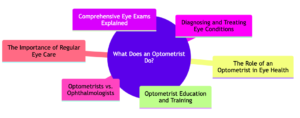What Does an Optometrist Do?
The Role of an Optometrist in Eye Health
What does an Optometrist do? This is a common question. Mainly because there are various fields within the eye-care world. This article will outline the key roles these Eye Doctors play in keeping our eyes healthy.
Optometrists are vital in maintaining eye health and ensuring good vision. They are not just about prescribing glasses – their role encompasses a wide range of eye care services. From diagnosing eye diseases to managing various eye conditions, Optometrists are the frontline professionals in eye health. They conduct thorough eye exams, provide accurate prescriptions for eyewear, and offer essential advice on eye care.
Key Takeaways
- Optometrists are central to maintaining eye health and vision care.
- They diagnose and manage a wide range of eye conditions.
- Regular eye exams by Optometrists are crucial for eye health.
- Optometrists prescribe eyewear and medications as needed.
- They differ from other eye care professionals in scope and practice.

Optometrist Education and Training
Becoming an Optometrist requires a dedicated educational path. Initially, aspiring Optometrists complete an undergraduate program, often focusing on sciences. Following this, they attend a four-year optometry school, delving deep into eye health, vision care, and general healthcare. Some Optometrists further specialize through residency programs, gaining expertise in areas like pediatric optometry, ocular disease, or vision therapy.
Comprehensive Eye Exams Explained
Comprehensive eye exams are essential, detailed evaluations that go far beyond basic vision checks. They play a critical role in the early detection of eye conditions, often before any symptoms are noticed. During these exams, Optometrists conduct a thorough assessment of both your vision and the overall health of your eyes. They meticulously check for signs of common eye diseases such as glaucoma, cataracts, macular degeneration, and diabetic retinopathy. Additionally, they evaluate how well your eyes work together, looking for issues like strabismus or amblyopia, which can impact your vision quality and overall eye health.
These exams also involve a detailed assessment of your eye’s internal and external structures. Optometrists use advanced diagnostic tools like slit-lamp microscopes, which allow them to examine the cornea, lens, and eyelids up close. They also perform retinal imaging to get a clear view of the back of your eye, including the retina, blood vessels, and optic nerve. This comprehensive examination is significantly more detailed than basic vision screenings, which typically only assess your ability to see clearly at a distance.
What to Expect at the Optometrist
When you visit an Optometrist, you’ll experience a thorough examination designed to assess various aspects of your eye health. This comprehensive process begins with a visual acuity test, where you read from an eye chart to evaluate your vision at different distances. The Optometrist then conducts a series of detailed assessments to ensure a complete understanding of your eye health.
- Visual Acuity Test: Determines clarity of vision at various distances using an eye chart.
- Eye Muscle Movement Test: Assesses the strength and coordination of eye muscles for proper alignment and function.
- Tonometry Test: Measures the pressure inside your eyes, crucial for detecting glaucoma.
- Ophthalmoscopy: Allows the Optometrist to examine the interior structures of your eyes, focusing on the retina, to identify any signs of diseases like retinal detachment or degeneration.
- Refraction Test: Determines the precise lens prescription needed to correct refractive errors such as nearsightedness or farsightedness.
- Peripheral Vision Test: Assesses the scope of your field of vision, identifying any issues with your side (peripheral) vision.
- Additional Assessments: Depending on your needs, the Optometrist may perform other tests to check for color vision accuracy, depth perception, and the overall health of the eye’s surface.
Eye Exam vs. Vision Screening
|
Procedure |
Eye Exam |
Vision Screening |
|
Scope |
Comprehensive assessment of eye health and vision |
Basic test for visual clarity |
|
Tests Conducted |
Visual acuity, eye pressure, eye muscle coordination, internal eye health |
Usually only visual acuity |
|
Equipment Used |
Advanced, such as slit-lamp, tonometer, retinoscope |
Basic or minimal |
|
Purpose |
Diagnose eye diseases, prescribe treatment, check overall eye health |
Identify need for glasses or further eye examination |
|
Conducted By |
Optometrist or Ophthalmologist |
Often conducted by non-eye care professionals |
Diagnosing and Treating Eye Conditions
Optometrists are equipped to diagnose and treat a wide array of eye conditions. Their expertise isn’t limited to prescribing glasses or contact lenses; they play a crucial role in identifying and managing various eye diseases, ensuring overall eye health and vision care. (1)
What Conditions Does an Optometrist Treat?
Optometrists are trained to diagnose and manage a spectrum of eye conditions. This includes common refractive errors like myopia (nearsightedness), hyperopia (farsightedness), and astigmatism, where vision correction is typically achieved through glasses or contact lenses.
They also treat more complex conditions such as glaucoma, cataracts in the early stages, diabetic retinopathy, and macular degeneration. Additionally, Optometrists manage eye infections, dry eye syndrome, and binocular vision disorders, providing comprehensive care that spans from initial diagnosis to ongoing management.
Eye Conditions Treated by Optometrists: Signs and Symptoms
| Condition | Signs and Symptoms |
| Myopia (Nearsightedness) |
Difficulty seeing distant objects clearly, squinting, eye strain, headaches |
| Hyperopia (Farsightedness) |
Difficulty focusing on close objects, eye strain, headaches, blurry vision at a short distance |
| Astigmatism |
Blurred or distorted vision at all distances, eye discomfort, headaches |
| Glaucoma |
Loss of peripheral vision, eye pain, headache, seeing halos around lights |
| Cataracts (Early Stages) |
Clouded, blurred or dim vision, increasing difficulty with vision at night, sensitivity to light |
When Should I Have My Eyes Examined?
Regular eye exams are essential for maintaining good eye health.
- Children: First exam at 6 months, again at 3 years, and before starting school.
- Adults: Every year, more frequently if you have a history of eye problems.
- Seniors: Annually, as they are at higher risk for conditions like glaucoma and cataracts.
- If Experiencing Symptoms: Such as vision changes, eye strain, or headaches.
- With Health Changes: Like diabetes diagnosis, which can affect eye health.
Optometrists vs. Ophthalmologists
The distinction between Optometrists and Ophthalmologists is essential in the realm of eye care, as it guides patients to the appropriate professional for their specific eye health needs.
Optometrists are primary healthcare professionals who specialize in regular vision care and the diagnosis and treatment of a range of eye conditions. Their training typically involves a four-year optometry program after undergraduate studies, focusing on eye health, vision care, and basic medical training. They are adept at conducting eye exams, prescribing medication and corrective lenses, and managing conditions like dry eye or glaucoma.
Ophthalmologists, on the other hand, are medical doctors who specialize in eye and vision care. Their training includes a medical degree followed by a residency in ophthalmology, which is typically three to four years. This extensive training equips them to handle more complex eye conditions, perform eye surgeries, and treat eye diseases both medically and surgically. They deal with the diagnosis and treatment of all eye diseases, perform eye surgery, and prescribe and fit eyeglasses and contact lenses to correct vision problems.
What Can an Ophthalmologist See That an Optometrist Cannot?
While Optometrists are skilled in diagnosing and managing many common eye conditions, certain complex eye diseases and surgical needs are typically within the scope of an Ophthalmologist.
Ophthalmologists have the training and authority to perform surgical procedures, such as cataract extraction, laser eye surgery for vision correction, and surgeries for retinal issues. They are also equipped to manage complex cases of eye diseases like advanced glaucoma, diabetic retinopathy requiring surgical intervention, and ocular oncology. In cases where a patient’s condition requires surgical intervention or a highly specialized treatment approach, an Optometrist will refer them to an Ophthalmologist. This collaborative approach ensures that patients receive comprehensive care tailored to their specific eye health needs.
Optometrist vs. Ophthalmologist
|
Condition |
Optometrist |
Ophthalmologist |
|
Refractive Errors |
Diagnosis and treatment |
Same, plus surgical options like LASIK |
|
Early-stage Glaucoma |
Diagnosis and management |
Advanced treatment, including surgery |
|
Cataracts |
Monitoring and referral |
Surgical removal |
|
Retinal Diseases |
Basic screening and referral |
In-depth diagnosis, treatment, and surgery |
| Eye Injuries | Basic care and referral |
Comprehensive treatment, including surgery |
Optometrists are your go-to for primary eye care and routine eye health management. For more advanced diseases, surgical needs, or when a condition is beyond the scope of optometry, an Ophthalmologist’s expertise becomes essential.

The Importance of Regular Eye Care
Regular eye care is not just about maintaining clear vision; it’s a crucial aspect of overall health care. Optometrists play a vital role in this regard. They don’t just correct vision; they are often the first to detect signs of systemic illnesses during routine eye exams. Conditions like diabetes, high blood pressure, and high cholesterol can manifest symptoms in the eyes long before other physical symptoms appear. Regular eye exams, therefore, are essential not only for ensuring optimal vision but also for monitoring overall health.
Optometrists also provide valuable advice on eye care, including tips for maintaining eye health, such as proper nutrition, eye protection, and managing screen time. Their guidance is particularly important for individuals at risk of eye diseases, like those with a family history of eye conditions or chronic health issues. By detecting eye problems early, Optometrists help prevent more serious complications, underscoring the importance of regular eye check-ups.
Wrapping Up: Trusting Your Vision to iRefract
Optometrists offer comprehensive eye care that goes far beyond prescribing glasses or contact lenses. They are integral in diagnosing, treating, and managing a wide range of eye conditions, playing a key role in preserving vision and overall eye health. Their expertise in early detection of eye diseases and systemic health issues makes them invaluable in the healthcare spectrum.
iRefract is dedicated to providing exceptional optometric services, upholding the highest standards of eye care. With a commitment to personalized care and the latest in eye health technology, iRefract ensures that your vision needs are met with professionalism and expertise. Trusting your vision to iRefract means receiving comprehensive care that prioritizes your eye health and overall well-being. Choose iRefract for a clear view today and healthy eyes for a lifetime.
Visit iRefract’s HOMEPAGE for more information. Call or schedule an appointment today!
Reference:
(1) College Of Optometrists, What is an Optometrist?, https://www.college-Optometrists.org/qualifying/a-career-in-optometry/what-is-an-Optometrist